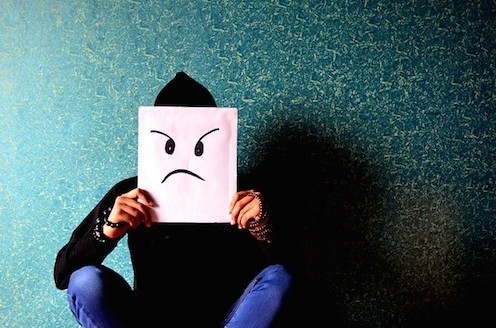It was so long ago but seems like almost yesterday—the day I swore I would never get angry again.
It was just the two of us, adding melted chocolate and butter to the flour and sugar mixture. I was animated and talked without reserve.
We giggled together at my imaginative stories. She let me scrape the sides of the mixing bowl with my tiny fingers and lick the spatula dipped in the gooey consistency before forming spoon-sized lumps for cookies.
It was one of those rare moments: I had her undivided attention, and I wanted it to last forever.
My little brother stormed into the kitchen and bulldozed his way into our world of chocolate delight and giggles. I continued talking in hopes of retaining her attention, hoping that she would find me more interesting and tell him wait, not now!
But she didn’t. Our conversation became my monologue.
I raised my voice, but she couldn’t hear me.
Anger was brewing beneath, burning the surface of my tongue and squeezing my throat. Then, I exploded—my six-year-old self unleashed her anger with a force that she didn’t know that she owned, ”I am talking to you! Listen to me!”
I think I startled her. Her reaction was automatic. It stung my cheek.
In shock, I stood there in the middle of the kitchen with chocolate smeared around my lips. My brother kept talking, and she kept listening. That moment went dark, and the taste of the chocolate went sour.
It was my fault, my anger’s fault. I knew it.
Nonetheless, it was acutely painful.
Right then, I made a promise that would accompany me most of my life—never will I be angry again because my anger can’t protect me; it only stings. My anger was monstrous—so humongous and ugly that it provoked her to react and if it had the power to do that what would it do to the rest of the world?
Eliminating this unattractive flaw would keep any future stings at bay.
So there I was, a newly altered six-year-old with a painted smile. I became one of those anger-less people.
It’s fascinating how the wounded ego comes up with split-second conclusions that then become unconscious cookie cutter templates for life. These interpretations are our personal way of making sense of any given situation so that we can regain a sense of equilibrium and ultimately feel safe. When we are hurt, we naturally react to defend and protect ourselves. It’s the animal within us that responds from the reptilian brain. More often than not, our reactions and split-second conclusions are without wise discernment and unless we are being chased by a mammoth, our knee-jerk conclusions and responses are seemingly inappropriate. They box us in and limit our potentiality of developing better-adapted reactions and most of all, learning life-enhancing lessons that cultivate our wholeness.
A happy face kept me safe and got me a lot more attention and love than its counterpart.
It was a cure-all band-aid that worked wonders until anger would pound once again at my door. I pretended not to hear it and wished it away. When I could no longer ignore it, I would hide it in my belly, but it burned the lining so I would thread it through the length of my intestines. But there too, it seeped out like an overflow of hidden toys under the safety of a child’s bed, so I deliberately pointed it at me. Staring down the barrel of anger kept it from hurting others and me getting punished.
But there were consequences in taking the shot because unexpressed and self-directed anger lead to depression and helpless victimization.
If I couldn’t witness my anger, I surely could see it in others.
Their reactivity scared me.
From the cussing-dish-throwing-out-of-control ones to the silent, unpredictable, time bombs, I did my best to dodge them. They were too much to handle and obviously triggered something deep within me. That something was my hidden anger that I had disowned and unconsciously transferred onto others. Because we can’t see ourselves, especially that which we have hidden or disowned, others become our mirror reflecting back to us what we need to reclaim.
The day came that shattered my split-second-cookie-cutter-promise and might just have saved my life.
Fast-forward a few decades.
I was late for my dance class that was held after office hours in a three-story corporate building. Like always, I dashed into the women’s restroom to empty my bladder and change into my dance clothes. Oddly enough the two-stall restroom was dark. I found it unusual but I was late, so I flicked on the lights and entered. One of the doors was closed with the occupied indicator showing red.
Again, I was late, so I ignored it.
Minutes later, my sixth sense yelled at me with anger because I wasn’t listening, ”You are in danger, get out of there now!” I looked up and then down and suddenly saw a hand with a camera peeking from under the plastic polyethylene partition that separated us.
It’s in these moments, in our dreams, that we scream, but nothing comes out. This wasn’t a dream— this was for real. From that fight or flight center of primal forces a deep masculine voice emerged from the depths of my gut swearing to rip his f***ing eyes out.
With a force that I didn’t know that I had, I machine-gunned karate-kicking the plastic divider between us.
The earth shook.
I think he was surprised, expecting to hear a high-pitched girly voice scream help me! I could hear him fumbling from all fours, opening the door to the stall and running down the stairs out the building. Still threatening to “rip his f***ing ugly face off,” I ran after him, but he was gone and thank goodness because my adrenalin and pent up anger might not have been enough to ward off that mammoth.
That day, that event and that man became my greatest insightful teachers. They forced me to see the truth. Every quality that we deem good or bad is within us and has it’s worthy place and appropriate time in our lives to empower us. When we unconsciously let the mind do it thing—judge, categorize, compare and filter out what we esteemed negative we consequently become fragmented and disempowered.
When we can courageously move past the finger pointing and let others and our life experiences show us what we need to learn to grow towards wholeness, there can be a massive shift in our perspective. It takes humility and inner strength to drop the judging finger and look within ourselves.
What are they mirroring back? What have I disowned that I need to reclaim?
The treasures hidden within our disowned qualities, like that of my anger, are priceless and once unleashed take us to new levels of awareness. I thought about the pure adrenalin of my anger that I experienced that day. It showed me that it’s a natural life preserving emotion and that in effect, all emotions are just energy that needs to be in motion for them to transform.
When my anger shows up at my door, I know that it holds an invaluable message for me. It has become my friendly internal barometer that lets me know when I have disrespected myself or allowed others to impinge on my territory. Anger has taught me how to get my needs met and when I can’t it becomes the catalyst for readjusting my expectations or making the necessary changes. Reclaiming my anger has taught me how to cultivate well-defined boundaries and to respect them. It has taught me to be a better listener to me and to others.
Allowing anger to be part of my toolbox, I have come to see that it has many different faces. Sometimes, all I need is to silently admit that I feel angry for it to recirculate. Other times, I need to verbally express it: I’m angry.
And again, sometimes my voice raises and I take action.
I know today that I can be angry and still love someone and be loved in return—having faith in this is a beautiful thing.
With time, I have come to witness how anger can co-exist with compassion and respect and that I no longer have to sever the ties with estranged relationships in the avoidance of expressing my anger. When I lean into my anger, I feel it’s empowering energy filling my being and anchoring me firmly into this moment, into my body and into my full potential of wholeness.
It has gifted me the force to be accountable for my life and know that I can stand in my protective power.
With gratitude and honor, I humbly bow to you, my cherished long lost friend, anger.
Author: Jessica Magnin
Editor: Renée Picard
Image: PDPics/pixabay












Read 9 comments and reply